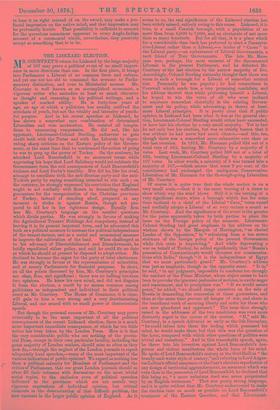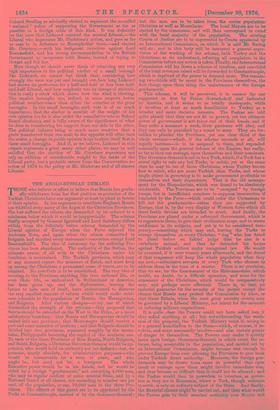THE LISICEARD TM - FICTION.
. 0017RTNEY'S return for Liskeard by the large majority of 107 may prove a political event of no small import- ance in more directions than one. In the first place, it brings into Parliament a Liberal of no common force and culture, and yet one not too old to command the avenues to Parlia- mentary distinction and even to Ministerial success. Mr. Courtney is well distinction, as an accomplished economist, a vigorous writer who embodies at least as much character as thought and reasoning in his political writings, and a speaker of marked ability. He is forty-four years of age, an age at which a politician has usually outlived the crotchets of youth, but not the vitality and intensity of youth- ful purpose. And in his recent speeches at Liskeard, he has shown a somewhat rare combination of determined Liberalism and wise moderation. He resisted all tempta- tions to unmeaning compromise. He did not, like his opponent, Lieutenant-Colonel Sterling, - endeavour to gain credit both with the Tories and with the Liberals by depre- cating sharp criticism on the Eastern policy of the Govern- ment, at the same time that he condemned the notion of going to war to prop up the power of Turkey. On the contrary, he attacked Lord Beaconsfield in no measured terms while expressing his hope that Lord Salisbury would yet extricate the Government from the evil consequences of Lord Beaconsfield's violence and Lord Derby's timidity. Nor did he, like his rival, attempt to conciliate both the anti-Russian party and the anti- Turkish party by saying something intended to win each • on the contrary, he strongly expressed his conviction that England ought to act cordially with Russia in demanding sufficient guarantees for the reorganisation of the Christian provinces of Turkey, instead of standing aloof, prepared at any moment to strike, in against Russia, though not pre- pared to aid her in her righteous design. Equally firm was Mr. Courtney's language on the smaller questions which divide parties. He was strongly in favour of making the Agricultural Tenants Holdings Act compulsory, instead of leaving it in its present impotent form, and he advocated this both as a political measure to increase the political independence of the tenant-farmer, and as a social and economical measure to improve the cultivation of the land. When challenged as to his advocacy of Disestablishment and Disendowment, he boldly repudiated either policy, and said he could fix no date at which he should at present be disposed to adopt either. He declined to become the organ for the party of total abstinence. He was strongly in favour of the representation of minorities, and of county Parliaments for financial purposes. In short, on all the points discussed by him, Mr. Courtney's principles are clear, firm, and significant ; there was no halting between two opinions. He knew his own mind, and did not disguise it from the electors, a merit by no means common among politicians as independent and individual in their political creed as Mr. Courtney. The House of Commons, it is clear, will gain in him a very strong and a very discriminating Liberal, and one armed with no small power of characteristic speech.
But though the personal success of Mr. Courtney may prove eventually to be the most important of all the political consequences of the recent Liskeard election, there is a much more important immediate consequence, of which far too little notice has been taken by the London Press. How is it that the very considerable public who see nothing of the provin- cial Press, except in their own particular locality, including the great majority of London readers, should miss so often as they now do,—through the neglect of the London journals to report adequately local speeches,—some of the most important of the various indications of public opinion? We regard as nothing less than a political calamity for Members of Parliament and the critics of Parliament, that our great London journals should so often fill their columns with discussions on the most trivial social topics, to the exclusion even of political speeches delivered in the provinces which are not merely very vigorous expressions of individual opinion, but critical elements in the determination of that difficult problem, the new currents in the larger public opinion of England. As it seems to us, the real significance of the Liskeard election has been widely missed, entirely owing to this cause. Liskeard, it is true, is a small Cornish borough, -with a population of no more than from 6,000 to 7,000, and an electorate of not more than as many hundreds. But for all that, it is a place which for a considerable time back has preferred to elect a Conserva- tive-Liberal rather than a Liberal,—a leader of " Caves " in the Liberal party,—an embarrasser of Liberal Governments, a tacit friend of Tory Governments. The late Mr. Hors- man was, perhaps, the most eminent of the discontented Liberals in the present Parliament, and he defeated Mr. Courtney at the last election by the narrow majority of five. Accordingly, Colonel Sterling naturally thought that there was room in such a borough for a Liberal of somewhat neutral tint. Personally he was popular ; he had connections in Cornwall which made him a very promising candidate, and his address showed that while professing himself a Liberal, he hoped to win the votes of all who were inclined to acquiesce somewhat cheerfully in the existing Govern- ment and its policy, while advocating, in theory at least, more Liberal principles. It is pretty clear that if public opinion in Liskeard had been what it was at the general elec- tion Lieutenant-Colonel Sterling would either have succeeded, or have lost his election by a very small majority. Yet in fact he not only lost his election, but was so utterly beaten that it was evident he had never had much chance,—and this, too, though there was a somewhat more exhaustive vote than on the last occasion. In 1874, Mr. Horsman polled 334 out of a total vote of 663, beating Mr. Courtney by a majority of 5 votes. Last week, Mr. Courtney polled 388 out of a total of 669, beating Lieutenant-Colonel Sterling by a majority of 107 votes. In other words, a minority of 5 was turned into a majority of 107,—which means that some 9 per cent. of the constituency had exchanged the ambiguous Conservative- Liberalism of Mr. Horsman for the thorough-going Liberalism of Mr. Courtney. Of course it is quite true that the whole matter is on a very small scale,—that it is the mere turning of a straw to show which way the wind blows. Still it is the turning of a very significant straw, when a borough which has for some time inclined to a chief of the Liberal " Cave," turns round and cordially adopts a Liberal of so very certain a sound as Mr. Courtney. And the significance of the event is the greater for the pains apparently taken by both parties to place the issue on the Foreign policy of the moment. Lieutenant- Colonel Sterling laid great emphasis in his address on the wisdom shown by the Marquis of Hartington, "as elected Leader of the Opposition," in "refraining from a too severe stricture of the foreign policy of the present Government while this crisis is impending." And while deprecating a war on behalf of Turkey, he added significantly that "Russia's possession of Constantinople would threaten our communica- tions with India," though "it is the independence of Egypt that we must particularly guard." Mr. Courtney's address was just as emphatic, though in the opposite sense. "It is," he said, "in my judgment, impossible to condemn too strongly the conduct of the Prime Minister, whose object seems to have been to provoke the ignorant jealousies of nations, to excite anger and resentment, and to precipitate war." "If we would assure peace," he added, "we should range ourselves on the side of Russia in demanding the concession of these guarantees, and thus at the same time prevent all danger of war' and share in the beneficent work of securing liberty and order for those who are now plundered and oppressed." The issue thus strongly raised in the addresses of the two candidates was even more distinctly urged in the course of the contest. "If," said Mr. Courtney, in a speech delivered as early as the 5th December, "he could infuse into them the feeling which possessed his mind, he would make them feel that this was the question of the hour, compared with which other questions of politics were trivial and transitory." And in this remarkable speech, again, he threw into his invective against Lord Beaconsfield's dan- gerous and violent manifestoes the whole force of his mind. He spoke of Lord Beaconsfield's oratory at the Guildhall as "the brandy-and-water style of oratory," and referring to Lord Augus- tus Loftus's official assurance of the Czar's absolute repudiation of any design of territorial aggrandisement, an assurance which was even then in the possession of Lord Beaconsfield, he declared that this being so, "a more nefarious deed was never perpetrated by an English statesman." That was pretty strong language, and it is quite evident that Mr. Courtney endeavoured to make the election turn as much as possible on Lord Beaconsfield's treatment of the Eastern Question, and that Lieutenant- Colonel Sterling as advisedly elected to represent the so-called "national" policy of supporting the Government as far as possible in a foreign crisis of this kind. It was definitely on this issue that Liskeard rejected the neutral Liberal,—the Liberal who deprecates Mr. Gladstone's action, and goes as far as may be in deference to Russophobist fears,—and elected Mr. Courtney,—with his indignant invective against Lord Beaconsfield, and his strong recommendation to the British Government to co-operate with Russia, instead of trying to thwart and foil her.
Now though we should never think of attaching any very high importance to the political verdict of a small borough like Liskeard, we cannot but think that, considering how strongly the issue was put and brought out, how long Liskeard had shown its preference for a half-and-half or less than half- and-half Liberal, and how emphatic was its change of attitude, this is really a straw which shows how the wind is blowing. The smaller boroughs are, indeed, in some respects better political weather-vanes than either the counties or the great boroughs. In the small boroughs, each vote is of so much importance, that the elector is sensible of the weight of his own opinion (as he is also under the cumulative vote in School Board elections), and is fully aware of the significance of what he does in transferring his support from one side to the other. The political balance being so much more sensitive that a grain transferred from one scale to the opposite will often turn the scales, a change in public opinion is apt to show itself first in these small boroughs. And if, as we believe, Liskeard in this respect represents a great many other places, we may be well satisfied that the election of Mr. Courtney represents not only an addition of considerable weight to the ranks of the Liberal party, but a probable return from the Conservative re- action of 1874 to the policy of Mr. Gladstone and of all sincere Liberals.



































 Previous page
Previous page